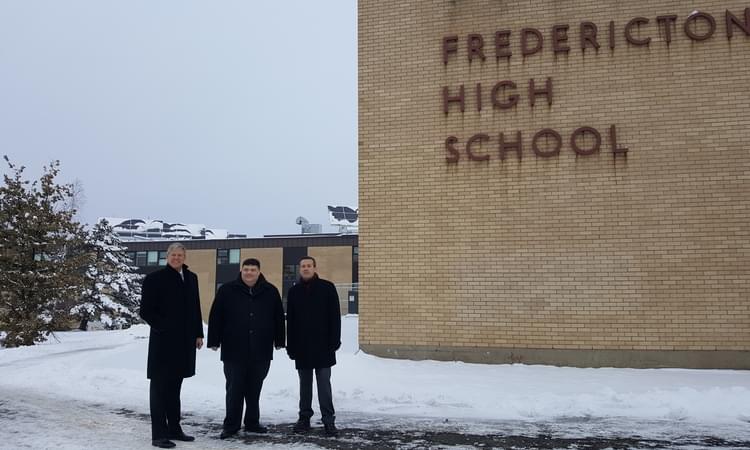UPDATED: N.B. to ‘repurpose’ gas tax – Telegraph Journal – 12 December 2017

Author by : ADAM HURAS, KATRINA CLARKE AND JOHN CHILIBECK Brunswick News
Photo by : Photo: Katrina Clarke/The Daily Gleaner
It isn’t consistent with what the majority of other provinces are doing. Unless there’s been some agreement with the federal government – and maybe there has been. The idea, I thought, was that we would develop our own pricing system that made sense for New Brunswick to avoid it being foisted upon us by the federal government. – David Coon
Deputy premier Stephen Horsman, Transportation and Infrastructure Minister Bill Fraser and Environment and Local Government Minister Serge Rousselle before a news conference at ASD-W offices.
FREDERICTON and OTTAWA • New Brunswick consumers won’t pay a direct carbon tax, says Serge Rousselle, the provincial minister responsible for the environment.
Instead, his Liberal government will “repurpose” existing gasoline and fuel taxes to fund programs to fight climate change, with the details of how New Brunswickers will be affected by a price on carbon in 2018 slated to be released Thursday.
The main opposition party at the legislature accused the Gallant government of trying to hide the tax in what will be an election year.
But Rousselle told reporters at a news conference Tuesday morning the government would not introduce a direct tax on consumers.
“The goal is not to make more revenue, the goal is to combat climate change,” Rousselle said, adding that legislation would be introduced Thursday. “This made-in-New Brunswick solution basically will minimize the impact on all New Brunswickers.”
Rousselle wouldn’t tell reporters how the government would make up the shortfall in revenues once the funds are redirected toward a fund meant to combat climate change. He also would not confirm if gasoline prices would escalate in future years as Ottawa’s mandated price for carbon rises.
“You’ll know more Thursday,” he said later in the day when reporters at the legislature asked him more questions.
He said the province would leave it up to Ottawa to tax industry.
But how that will work is still more than a year away, according to the federal government. The Trudeau government said it has yet to determine if New Brunswick’s plan meets its standards.
It will be assessed next year.
Ottawa could impose additional measures if the province’s plan fails to meet Ottawa’s call for a price on carbon pollution of $10 per tonne next year.
Tory opposition leader Blaine Higgs described Rousselle’s comments as election planning. The provincial election is scheduled for Sept. 24.
“Going into an election year, they don’t want to face a carbon tax increase,” Higgs told reporters. “So shove it into a gas tax, make it just kind of go away, get the flexibility for increasing it at random down the road, and the issue is just gone till after the election.”
Higgs said he doesn’t believe New Brunswick needs a tax to reduce emissions. Industry, he said, should be told it has to meet certain targets or risk being fined.
Green party leader David Coon said what Rousselle announced would not meet Ottawa’s requirements – at least not the ones the federal government said it would force provinces to abide by last June.
“It isn’t consistent with what the majority of other provinces are doing,” Coon said in an interview. “Unless there’s been some agreement with the federal government – and maybe there has been. The idea, I thought, was that we would develop our own pricing system that made sense for New Brunswick to avoid it being foisted upon us by the federal government.”
The province’s website states its gasoline tax is set at 15.5 cents per litre. Motive fuel, or diesel, is taxed at 21.5 cents, propane at 6.7 cents, aviation fuel at 2.5 cents and locomotive fuel at 4.3 cents.
It’s unclear if that will change.
On the industrial side, the Gallant government will rely on Ottawa to police emissions.
“We believe the rigorous nature of the federally administered industrial emission program will provide a system in which big emitters are paying their fair share,” Rousselle said.
Jonathan Wilkinson, the parliamentary secretary to the minister of environment and climate change, told the Telegraph-Journal on Tuesday he’s “pleased” to see the province moving forward.
Ottawa has said it would impose a carbon tax on New Brunswick and other provinces in 2018 if one isn’t already voluntarily in place.
Earlier this year, it unveiled the model it would enforce. The federal model for industry is an “output-based pricing system” that would set limits on pollution. The more a factory pollutes above a limit in comparison to its same-sector peers, the more it would pay.
Additionally, the more an industrial facility reduces its emissions below the limit, the more it could earn by selling credits to less efficient competitors.
That could mean the largest New Brunswick emitters may not end up paying at all.
“Large emitters will pay only if they are not performing at a higher level in terms of greenhouse gas emissions relative to their peers,” Wilkinson said.
The Trudeau government has said that an output-based pricing system will not come into effect before Jan. 1, 2019.
It will spend next year compiling comparatives on a sector by sector basis.
“There will be lots of discussion and consultation about that,” Wilkinson said.
Meanwhile, a firm date on when the provinces need to have their regimes in place has yet to be set, although it likely won’t be until near the end of 2018, Wilkinson said.